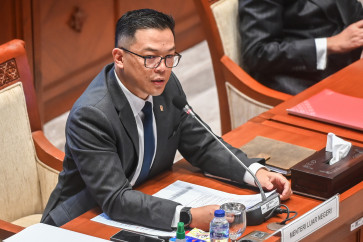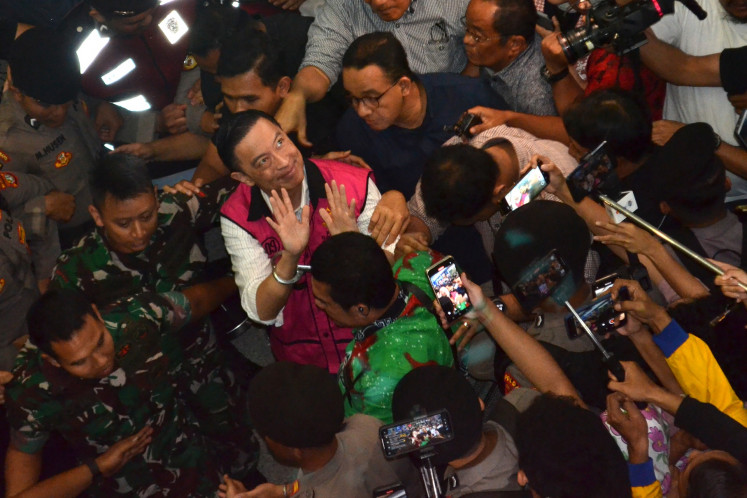Popular Reads
Top Results
Can't find what you're looking for?
View all search resultsPopular Reads
Top Results
Can't find what you're looking for?
View all search resultsSocial security bill needs realistic approach
The main issues behind the recent suspension of the House of Representatives’ approval of the controversial social security and insurance bill is not only the uncertain fate of state insurance companies PT Jamsostek, PT Askes, PT Taspen and PT Asabri, but mainly unresolved problems raised by the 2004 National Social Security System Law
Change text size
Gift Premium Articles
to Anyone
T
he main issues behind the recent suspension of the House of Representatives’ approval of the controversial social security and insurance bill is not only the uncertain fate of state insurance companies PT Jamsostek, PT Askes, PT Taspen and PT Asabri, but mainly unresolved problems raised by the 2004 National Social Security System Law.
The House and the government have been at loggerheads over the contentious bill because implementation of the national social security system and its financing and enforcement is not clearly regulated in the law.
The Law on the National Social Security System stipulates that both workers and employers contribute to five compulsory programs — healthcare, death, employment injury, old-age risk and pension benefits — while the premiums of the poor and dismissed workers are covered by the state.
If the social security funds are collected from taxes as in the British model, the state should contribute to all participants for fairness and its benefits should be limited to allow all the people to live a humane life as stipulated by the ILO Convention on social security programs.
If the financing stems from participants’ contributions, as has been practiced in Germany since the reign of prime minister Otto von Bismarck, the programs’ providers should be based on the segments of the population and professions, while their benefits vary according to the people’s professions and positions in their workplaces.
Singapore provides pension benefits under the Central Provident Funds (CPF) because of its small population. It is too far fetched for Indonesia, home to 237 million people, to adopt such a program.
Besides, employers have also opposed the law, as it requires them to cover the cost of all workers, including 70 million people employed in the informal sector. The law’s main weakness is the fact that it carries no penal sanctions on the government or employers if they do not pay their contribution.
The rough concept of funding social security has indirectly created a crucial problem for the House and the government concerning which party would be responsible for providing the social security programs, especially when both sides agreed to establish two providers and merge the existing four state insurance companies into two.
The bill ideally regulates the establishment of a single nonprofit organization directly under the President’s supervision to run the five social security programs as well as ensure their standard benefits for all participants. But this looks unrealistic because, besides financial reasons, all participants with their different professions and living standards are regarded as one group that receives similar benefits.
Like welfare states in Europe, Indonesia will face financial problems if the contribution of the poor and dismissed workers — now around 80 million nationwide — have to be covered by the state budget. So far, the state has covered the social security scheme for more than 4 million civil servants, soldiers and police officers.
The House and the government will overcome the deadlock over crucial issues in the bill if both sides agree to review the 2004 Social Security System Law and determine the fate of the four existing social insurers.
The House has agreed to accept the government’s proposed establishment of two insurance program providers, but the latter should allow transformation (read merger) of the four state-owned insurance companies into the two new ones. This, however, has sparked a new controversy and strong opposition from the both the management and workers of the four companies. It has also sparked support and opposition among workers and labor unions.
Some workers support the merger of the four companies, citing their role as the money makers for government officials and political parties. Other workers oppose the merger, considering the four enterprises’ assets, which total Rp 195 trillion (US$23.01 billion). The money will be used to fund the two new social security providers if the merger takes place.
To ensure the maximum benefits of the five insurance programs for all the people and accountability for the huge funds, the government and the House should assign the two new insurers to provide social security programs for the poor and dismissed workers as well as transform the four existing companies into non-profit organizations that are directly supervised by the President. Being non-profit organizations, they will have no obligations to pay taxes and dividends to the state.
The social security programs for workers have been in trouble not because of institutional problems but because of their low coverage rates. PT Jamsostek, which since 2007 has no longer paid dividends to the government, has covered only 9.5 million of 30 million workers in the formal sector because of the absence of strong enforcement of the 1992 Social Security for Workers Law.
To ensure the five compulsory programs work well, the bill should give insurers full authority to enforce the law and bring to court government officials and employers who fail to pay their contributions to the national programs.
The author is a staff writer at The Jakarta Post.










